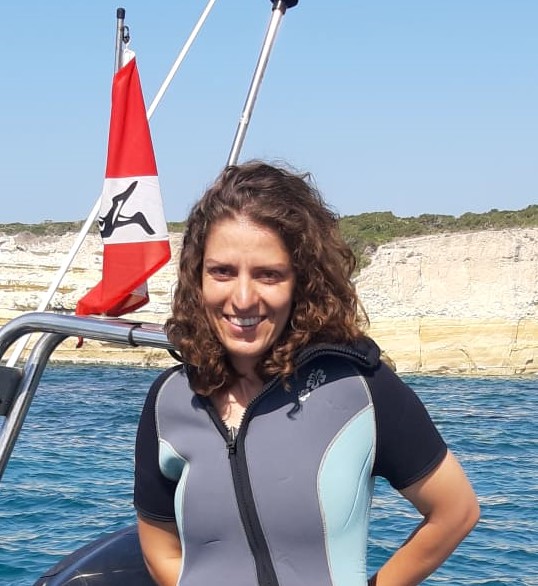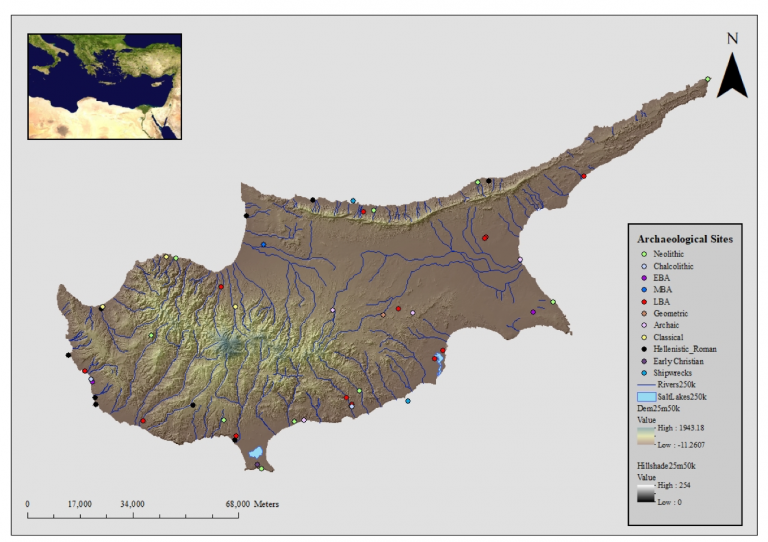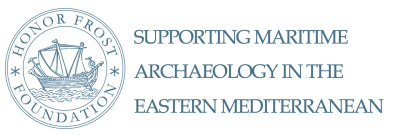Maria Michael - 2018-2021 - University of Southampton PhD Scholar
 In January 2018, having secured an HFF doctoral scholarship, I started the PhD program at the University of Southampton, under the supervision of Dr. Julian Whitewright, Dr. Anna Collar, and Dr. Jaco Weinstock. The PhD thesis entitled “To fish or not to fish? The case study of fishing activity in Cyprus” attempts for the first time to gather all the available evidence for fishing (e.g. harpoons or spears, fish hooks, stone, clay, bronze or lead weights for net or line and traps) in Cyprus in a single body of evidence in order to interpret correctly the archaeologically neglected aspect of the fishery.
In January 2018, having secured an HFF doctoral scholarship, I started the PhD program at the University of Southampton, under the supervision of Dr. Julian Whitewright, Dr. Anna Collar, and Dr. Jaco Weinstock. The PhD thesis entitled “To fish or not to fish? The case study of fishing activity in Cyprus” attempts for the first time to gather all the available evidence for fishing (e.g. harpoons or spears, fish hooks, stone, clay, bronze or lead weights for net or line and traps) in Cyprus in a single body of evidence in order to interpret correctly the archaeologically neglected aspect of the fishery.
Honor Frost is probably the first archaeologist to address the issue of misinterpretation and incorrect classification of finds related to fishing in Cyprus when she attempted to distinguish three limestone fishing weights recovered in the archaeological site of Kition from the similarly shaped stone anchors. Through her brief study of these three limestone fishing weights in the 70s, she highlighted the lack of a holistic approach to examine fishing in Cyprus during antiquity. She also proved that the simultaneous analysis of archaeological finds of fishing gear with iconographic and ethnographic sources can provide a more accurate interpretation of all these elements and a more integrated reconstruction of the fishing methods and activities used in ancient societies through time. Consequently, in the footsteps of Honor Frost, my research achieved to explore the tradition of fishing on the island of Cyprus through time, from the Neolithic to Early Christian periods, by developing a systematic, interdisciplinary approach for recording the available evidence.
In other words, my PhD thesis attempts to understand the relationship between fishers and their maritime environment and how this relationship affected the technological and ideological development of fishing activity in Cyprus in the past. To achieve these objectives, a unique multi-disciplinary approach is adopted, in which maritime archaeo-ichthyologic data, ancient textual sources, iconographical representations, and geospatial analysis are applied. Environmental, marine biological, and ethnographic data is combined with the archaeo-ichthyologic evidence in order to illuminate aspects that are invisible in archaeological records and help further the understanding of fishers’ mental maps.
Through this approach, it is obvious that Cypriots have been engaged in fishing activity diachronically, and they used a variety of fishing methods to exploit both coastal and pelagic resources daily. Their resulting daily interaction with the maritime environment leads to the ongoing development of local maritime knowledge, which could, in turn, lead to the diachronic growth and preservation of fishing activity. Also, technological choices/changes, and how the socio-economic aspects of Cypriot society affected the development of fishing activity are highlighted in my research. Consequently, my research provides the first comprehensive assessment of fishing activity in the archaeological, maritime context of Cyprus through time. This is an important contribution to the study of maritime archaeology in Cyprus, which is mainly focused on shipwreck archaeology.
Since I started my PhD in 2018, I had the opportunity to also assist and participate in the two seasons (2018 and 2019) of the underwater survey conducted in Dreamer’s Bay (Cyprus) directed by Dr. Lucy Blue and funded by the HFF. Currently, I will be one of the coordinators of this project. I also had the opportunity to attend numerous courses, which are always supported by the HFF. In July 2019, I attended a two-day course for the study and interpretation of fish remains given by Mrs. Sheila Hamilton Dyer. This course enhanced my knowledge of ichthyology and helped me to understand how fish remains contribute to the interpretation of archaeological evidence relating to fishing activity, which is essential for my research. In addition, I had the opportunity to provide sessions on fishing activity in antiquity as part of the MA course “Mediterranean Seafaring” given by Dr. Julian Whitewright at the University of Southampton.
Furthermore, I have presented my work in various conferences, including Under the Mediterranean I (2017), MAGS 2019 and 2021, The International Open Workshop in Germany (2019), Cypriot archaeology, pre-modern material culture, and cultural heritage in the UK (2019), PGRAS (2019 and 2020), EAA Conference in Kiel (2021). These presentations led to publications, which can be found at https://soton.academia.edu/MariaMichael.
In 2019, I was also a member of the MAGS 2019 organizing committee; as a result, I organized the MAGS conference in collaboration with colleagues from Oxford and Southampton. With the assistance of Bob Holtzman, I have edited and completed the online publication of the MAGS 2019, which is available at https://honorfrostfoundation.org/publications/short-reports/mags-2019/. By 2021, I also became a member of the MAGS steering committee, which aims to secure the continuation, succession, process, and future of MAGS, which is funded by the HFF. Finally, after my thesis defense in December 2021, I had the honor of presenting in the 10th HFF annual lecture, where my lecture outlined how my current research and career supported by the HFF has been furthering the aim of the HFF in capacity building and developing maritime archaeology in Cyprus.
Twitter username: @Maria_Enalia
Academia.edu profile: https://soton.academia.edu/MariaMichael.

Fig.1: Map of the archaeological sites, where finds of fishing gear and identified fishbone assemblages recovered. (source: Map produced by Maria Michael by using the ArcGIS 10)
